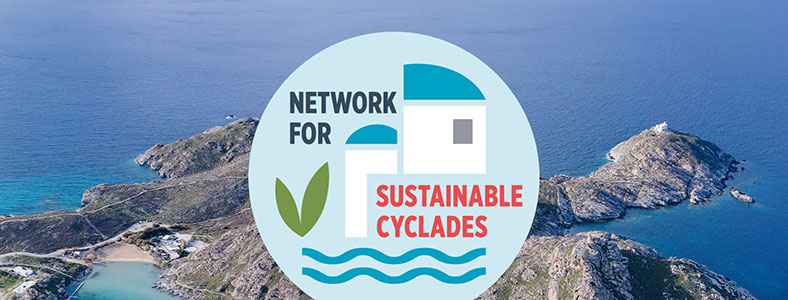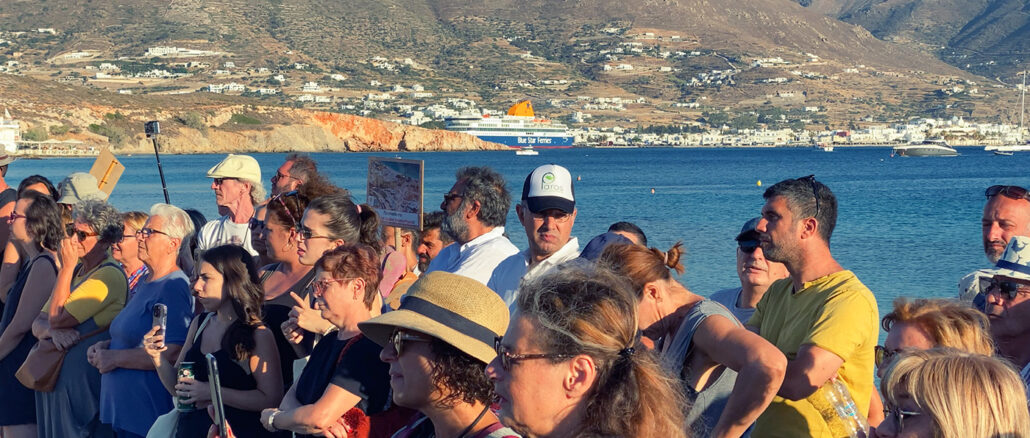PRESS RELEASE OF THE NETWORK FOR SUSTAINABLE CYCLADES
October 2024
Civil Society together with Local Government can succeed in protecting the public interest
The last year and a half has seen a flurry of activity in local communities opposing government policies around land use and development strategy, voicing not only objections but also proposals for a different approach to what we call ‘development’. Particularly in the Cyclades, but not only in the Cyclades, a mobility is developing that seems to some extent to have already had significant positive results and raises hopes for even more. In several cases, and especially when citizens’ efforts are reinforced and supported by the local authorities, we already have visible victories of these citizens’ efforts and it is worth noting them because they are the best proof that there is another way, and that imposing destructive interventions in the area through real estate logics is not a one-way street. We are summarizing indicatively:
- Last year’s mobilization of the citizens of the “Beaches Movement” forced some services to mobilize and finally the Government through the Minister of Finance Mr.Hatzidakis to take measures to “settle” and punish the major illegalities. Although the legislation has several “holes” that leave coastal ecosystems and public space unprotected from predatory and short-sighted business and the climate crisis, it has nevertheless, at least in the area of unauthorized use for umbrella stands, imposed a relative legality.
- The mobility of citizens in the Municipalities of Attica and the appeals of the Mayors to the Council of State against the New Building Regulation (NOK) which gave two extra floors to those who put green on the roofs of buildings (the definition of greenwashing) led to the suspension of its implementation, despite the furious reactions of the Technical Inspectorate of Athens.
- The efforts of a group of Sifnos citizens who took legal action against a port project in Sifnos were recently vindicated and the project was annulled.
- The reactions of the residents, friends and the Municipality of Astypalea led to a reversal of the government’s stance, forcing Mr.Tagaras to declare in Parliament that he will not sign the abortion approved by the Ministry’s services and the KESYPOTHA. The Ministry of Environment has already tacitly adopted the practice of refusing to approve special planning applications submitted by big “investors” until the Local Planning Plans (LPPs) are prepared.
We note here that governmental retreats, although they give a credit of time, in no way imply some kind of resignation of governmental policy from the perspective of the disastrous overexploitation of space. This can be clearly seen from the proposals for the Tourism Spatial Plan and from the content of the scenarios proposed for the forthcoming Local Urban Plans. This is only a postponement which does not in any way invalidate the prospect of the approvals of specific urban planning and many other interventions in favour of full and unconditional tourism, now based on a more secure legal framework. However, it is precisely at this point that the importance of local government and its attitude becomes clear: Recently the Municipality of Skyros with a unanimous decision rejected the “development” scenarios for Skyros promoted by the Ministry & The government of Skyros has decided with a clear and unanimous decision to reject the “development scenarios” for the town of Skyros, which were presented by the Ministry and the Ministry of Transport and Communications through its proposals for the new Town Council of Skyros. Shortly before, the Municipality of Santorini expressed serious objections to the proposed Special Spatial Plan for Tourism. At the same time, mayors of 7 Cycladic islands (Tinos, Antiparos, Santorini, Paros, Kea, Anafi and Amorgos) participating in the Blue Municipalities Network along with 12 other mayors mainly from the island country, sent a letter to the Prime Minister asking him to address the issue of overbuilding and exceeding the carrying capacity of their islands. A similar letter focusing mainly on caves, special urban planning and swimming pools was also sent by the Municipality of Paros. In the same vein, the Network for Sustainable Cyclades, which through its founding declaration a year ago, pointed out the risk of a definitive loss of the islands’ identity through off-scale private and public construction, while proposing an alternative development scenario. In the petition that is currently circulating among citizens and municipal councils, it calls for immediate measures such as the prohibition of the construction of swimming pools, the abolition of caves that distort the landscape (taking as a bonus 50% extra building!), the protection of paths, the restriction of the opening of new roads, the avoidance of ESXASE and ESXADA and the application of the case law of the CoE regarding off-site building. One year after the establishment of the Network, the road ahead is long and difficult. Small or large successes of the efforts of citizens and local authorities do not guarantee a happy ending. In Ios, Amorgos, Syros and elsewhere, there are very important local reaction movements that have been fighting for years, without having achieved final results for the time being. However, it is precisely the massing of efforts and the partnerships that are gradually being organised that give a new and promising dynamic. Together we can defend the public interest and the resilience of the islands. There is another way to truly sustainable development. And we know how to walk it. Coordination of the Network for Sustainable Cyclades
(K. Kanakari, J.Moe, T. Pantelios, E. Papazoi, G. Spilanis, N. Stefanou)




Leave a Reply
Want to join the discussion?Feel free to contribute!